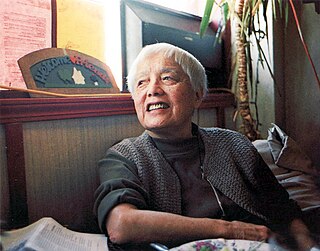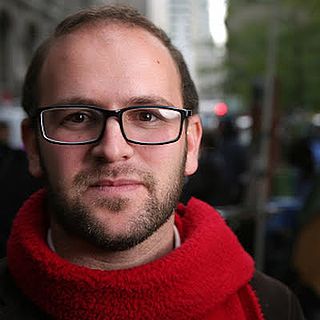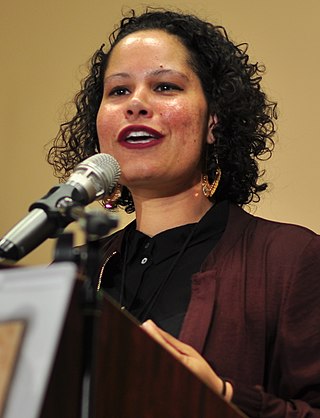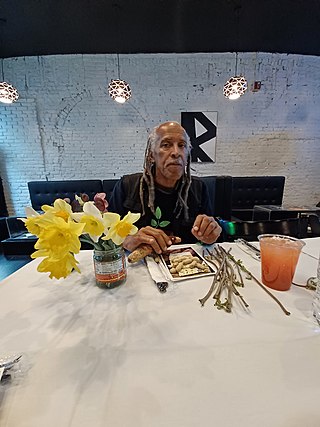Related Research Articles
Global Exchange was founded in 1988 and is an advocacy group, human rights organization, and a 501(c)(3) organization, based in San Francisco, California, United States. The group defines its mission as, "to promote human rights and social, economic, and environmental justice around the world." Global Exchange deals with a wide range of issues, ranging from the U.S. war in Iraq to worker abuse and fair trade issues.

Civic engagement or civic participation is any individual or group activity addressing issues of public concern. Civic engagement includes communities working together or individuals working alone in both political and non-political actions to protect public values or make a change in a community. The goal of civic engagement is to address public concerns and promote the quality of the community.
The Johnson–Forest Tendency, whose supporters are called the Johnsonites, is a radical left tendency in the United States associated with Marxist humanist theorists C. L. R. James and Raya Dunayevskaya, who used the pseudonyms J. R. Johnson and Freddie Forest respectively. They were joined by author/activist Grace Lee Boggs, who was considered the third founder.

James Boggs was an American political activist, auto worker and author. He was married to philosopher activist Grace Lee Boggs for forty years until his death.
Community building is a field of practices directed toward the creation or enhancement of community among individuals within a regional area or with a common need or interest. It is often encompassed under the fields of community organizing, community organization, community work, and community development.
The United States Social Forum is an ongoing series of gatherings of social justice activists in the United States which grew out of the World Social Forum process, bringing together activists, organizers, people of color, working people, poor people, and indigenous people from across the United States. Its purpose is to build unity around common goals of social justice, build ties between organizations at the event, and help build a broader social justice movement. Planning for the first event was spearheaded by the organization Project South: Institute for the Elimination of Poverty and Genocide, and involved dozens of other organizations around the United States. The Forum defines itself as "a movement-building process. It is not a conference but it is a space to come up with the peoples’ solutions to the economic and ecological crisis. The USSF is the next most important step in our struggle to build a powerful multi-racial, multi-sectoral, inter-generational, diverse, inclusive, internationalist movement that transforms this country and changes history."
Benny Andrews was an African-American artist, activist and educator.

The Trumbullplex is a housing collective and showspace in the Woodbridge neighborhood of Detroit, Michigan, USA.
Shawn A. Ginwright is Professor of Africana Studies at San Francisco State University and author. His research examines the ways in which youth in urban communities navigate through the constraints of poverty and struggle to create equality and justice in their schools. Ginwright has also been noted for his studies in hip hop academics.

Grace Lee Boggs was an American author, social activist, philosopher, and feminist. She is known for her years of political collaboration with C. L. R. James and Raya Dunayevskaya in the 1940s and 1950s. In the 1960s, she and James Boggs, her husband of some forty years, took their own political direction. By 1998, she had written four books, including an autobiography. In 2011, still active at the age of 95, she wrote a fifth book, The Next American Revolution: Sustainable Activism for the Twenty-First Century, with Scott Kurashige and published by the University of California Press. She is regarded as a key figure in the Asian American, Black Power, and Civil Rights movements.

American Revolutionary: The Evolution of Grace Lee Boggs is a 2013 American biographical documentary film directed by Grace Lee.

The Walter P. Reuther Library, Archives of Labor and Urban Affairs, located on the campus of Wayne State University in Detroit, Michigan, contains millions of primary source documents related to the labor history of the United States, urban affairs, and the Wayne State University Archives. The building is named for UAW President and Congress of Industrial Organizations President Walter Reuther.
Stephanie Gray Chang is an American politician and a Democratic member of the Michigan Senate, representing the 3rd district. She previously served in the Michigan House of Representatives representing the 6th District.
Project South: Institute for the Elimination of Poverty and Genocide is a non-profit organization based in Atlanta, Georgia that incorporates sociological research into education and organizing projects. Project South focuses on developing activist strategies in response to social issues in the Southern region of the United States. The organization was founded in 1986 by Jerome Scott and Walda Katz-Fishman.
Revolutionary Action Movement (RAM) was a Marxist-Leninist, black nationalist organisation which was active from 1962 to 1968. They were the first group to apply the philosophy of Maoism to conditions of black people in the United States and informed the revolutionary politics of the Black Power movement. RAM was the only secular political organization which Malcolm X joined prior to 1964. The group's political formation deeply influenced the politics of Huey Newton, Bobby Seale, and many other future influential Black Panther Party founders and members.

Justin Wedes is an entrepreneur, community organizer and social justice activist. He is a former member of the Occupy Wall Street movement, founding member of the Detroit Water Brigade and CEO of The Liberati Group, a strategic communications firm, and Flow Video a production company specializing in Education and Non Profits.

Nikkita R. Oliver is an American lawyer, non-profit administrator, educator, poet, and politician. They were a candidate for Mayor of Seattle in the 2017 mayoral election, but finished third in the primary with 17% of the vote. Oliver was defeated again in an at-large Seattle city council race in 2021.

Adrienne Maree Brown, often styled adrienne maree brown, is a writer, activist and facilitator. From 2006 to 2010, she was executive director of the Ruckus Society. She also co-founded and directed the United States League of Young Voters.

Scott Kurashige is an interdisciplinary scholar of race and ethnic studies, currently serving as an adjunct instructor at the University of Washington. Prior to that, he was a Professor and Chair of Comparative Race and Ethnic Studies at Texas Christian University. He is author of The Shifting Grounds of Race: Black and Japanese Americans in the Making of Multiethnic Los Angeles (2008) and The Fifty-Year Rebellion: How the U.S. Political Crisis Began in Detroit (2017). With Grace Lee Boggs, he co-authored The Next American Revolution: Sustainable Activism for the Twenty-First Century (2011) and was also a co-author and co-editor of Exiled to Motown: A History of Japanese Americans in Detroit.

Jim Embry is a lifelong civil rights activist, eco-activist farmer, social justice advocate, educator, public speaker, photographer, scuba diver, writer. He is active in the local food and sustainable agriculture movement. In 2006, he founded the Sustainable Communities Network. Embry is the Director of the Sustainable Communities Network. He has over 50 years of experience as a social activist.
References
- 1 2 3 4 Putnam, Julia. "A Lifelong Search for Real Education". YES! Magazine. Retrieved August 30, 2018.
- 1 2 Wey, Tundey (November 9, 2012). "The Boggs Center". Urban Innovation Exchange. Retrieved August 30, 2018.
- 1 2 Baker, Rachael (March 4, 2018). "A century of Grace; restorative spatial justice, pedagogy, and beloved community in twenty-first century Detroit". Gender, Place & Culture. 25 (3): 434–454. doi:10.1080/0966369x.2018.1443909. ISSN 0966-369X. S2CID 150132401.
- 1 2 3 4 Rhea, Shawn. "Detroit Renaissance". YES! Magazine. Retrieved August 30, 2018.
- 1 2 3 Boggs, Grace Lee; Kurashige, Scott (June 16, 2011). "Planting Seeds of Hope: How Sustainable Activism Transformed Detroit". YES! Magazine. Retrieved August 30, 2018.
- 1 2 3 Lewan, Amanda (June 6, 2014). "Jenny Lee". Urban Innovation Exchange. Retrieved August 30, 2018.
- 1 2 Jackman, Michael. "How Boggs School principal Julia Putnam is rethinking education". Detroit Metro Times. Retrieved August 30, 2018.
- ↑ Christensen, Diana (November 3, 2014). "An Activist's Journey". Hour Detroit. Retrieved August 30, 2018.
- ↑ Lee, Jenny; Abowd, Paul (March 17, 2011). "Detroit's Grassroots Economies". In These Times. ISSN 0160-5992 . Retrieved August 30, 2018.